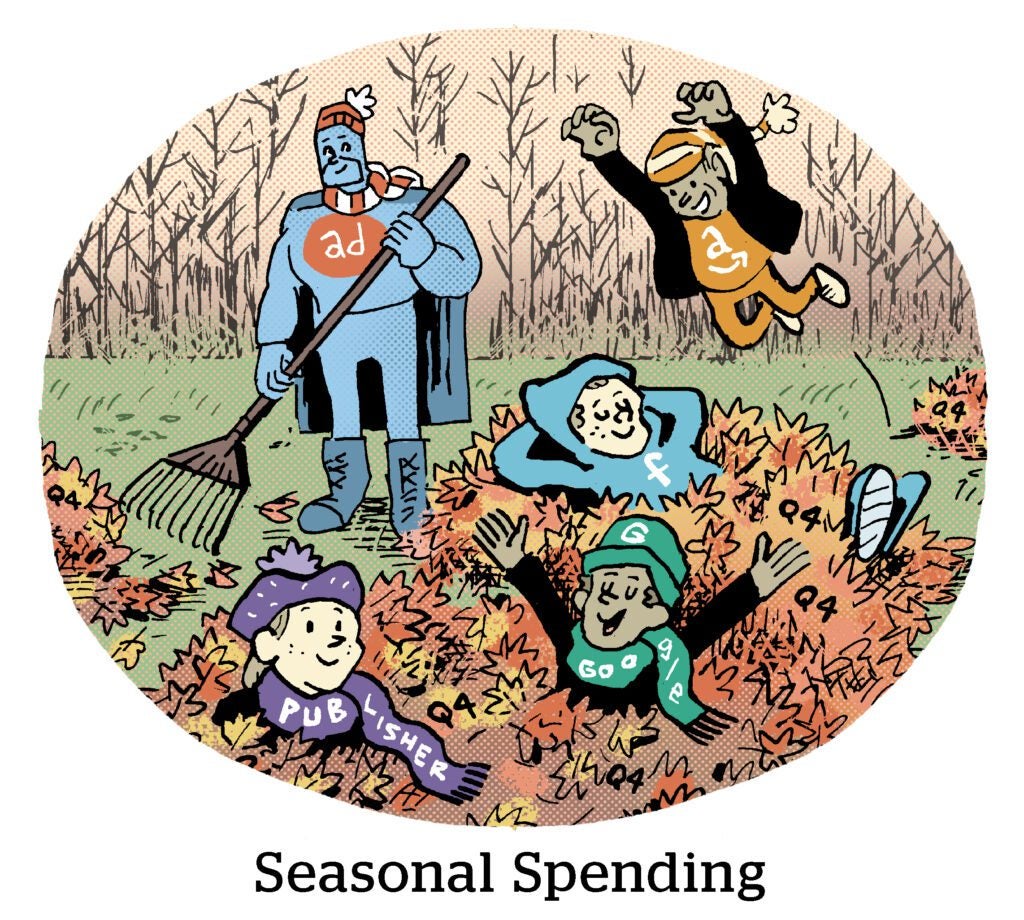Whales In The Ocean
Mediaocean has a new certified partner program, which it’s billing as a way for advertisers to use its suite of products more effectively. The inaugural partners are Interpublic, WPP and Omnicom.
Ho-hum. What’s the big deal about another partner program launch?
For one, this is kind of a flex for Mediaocean. Usually, we see big players like Walmart, AWS, Snowflake, Google and Meta making announcements like this.
But there’s more to the story, and you’ll miss it if you only scan the press release, which buries the lede, which is this: Interpublic, Omnicom and WPP will each acquire a small minority interest in Mediaocean as a part of their strategic partnerships.
Now that’s interesting.
“All too often we see partnership announcements that seemingly go nowhere. This partnership is the opposite,” Bill Wise wrote in an email to AdExchanger.
Wise calls it a “multi-faceted” deal, and he said the equity investment is a sign of long-term commitment on both sides. “Plus,” he added, “we put that investment to use and acquired Innovid!”
Un-Affiliated
Google’s “site reputation abuse” search update is cratering publisher affiliate revenue during the year’s busiest shopping season, Press Gazette reports.
The purpose of the search rankings update, which went live in March, is to prevent big-name publishers from propping up affiliate marketing businesses by publishing product reviews unrelated to their usual content verticals. The policy also cracks down on sites that host promotional deals or content on behalf of third parties.
Then, in November, Google clarified that unrelated affiliate content would be demoted in search regardless of whether it was produced by a third party or the publisher itself.
SEO experts believe Google is implementing these penalties manually rather than via an algorithm change. As a result, entire site subsections, including Forbes Advisor, USA Today Reviewed, Newsweek Vault, Independent Advisor and The Sun Shopping, are seeing sudden, massive drop-offs in search referrals, according to SEOFOMO Hub. But similar subsections, like the NYT’s Wirecutter, seem unaffected.
Rather than singling out particularly objectionable behavior, Google is taking issue because “the content is monetized with affiliate links rather than advertising, so Google can’t make money from it directly,” SEO expert Barry Adams theorizes, speaking with Press Gazette.
Pubs aren’t taking this update lying down. The News/Media Alliance announced Monday that it’s requesting the DOJ and FTC put the kibosh on Google’s new policy.
Fork In The Roe-d
Speaking of government action, the FTC is urgently tackling cases related to mobile location data.
It’s trying to establish precedent about how data might be tied to an individual at “sensitive locations,” mainly with abortion clinics in mind.
Just yesterday, the FTC announced an enforcement action against Mobilewalla and also secured a settlement with Gravy Analytics, both of which are location data providers.
Prohibiting the use of any data associated with sensitive locations has been an FTC priority for some time, including hospitals and clinics, houses of worship, union offices, military bases, schools and social services centers.
The unspoken rationale for the rapid pace of enforcement is that the FTC majority will soon swing back across the aisle. When that happens, a new enforcement agenda will take hold under a Republican-led FTC and on a state-by-state basis.
In Texas, for instance, a new law guarantees a minimum $10,000 reward for anyone who provides evidence leading to the arrest of a resident who left the state to obtain an abortion or who helped someone do so. Connecting mobile devices that reside in Texas to IDs found at abortion clinics elsewhere is technically trivial – and highly profitable – if that data is commercially available.
But Wait! There’s More!
Why is Google losing market share in the EU? [Search Engine Journal]
An employee lawsuit accuses Apple of spying on its workers. [Semafor]
And in other news, Apple now faces a class action lawsuit in the UK for its App Store commission charges. [Bloomberg]
Meanwhile, Roblox tries to get around App Store fees by charging less for its in-game currency on other platforms. [The Verge]
Putting money back into billboards might help advertisers cut their carbon emissions. [Adweek]
Wall Street investors predict a Netflix price hike is on the way. [Business Insider]
The Verge launches an ad-light paid subscription. [The Verge]
You’re Hired!
Secret Level, the AI studio that produced Coca-Cola’s recent ad spots, has a new CEO in former Monks exec Eric Shamlin. [Ad Age]
Smadex, Entravision’s mobile ad and CTV platform, hires Jamil Downey as VP and GM for the Americas. [release]











